Helmed by Edward Berger, ‘Conclave‘ is a Christian thriller drama that delves into the complex politics of the papal election process through the eyes of Cardinal Thomas Lawrence, a British clergyman in the Halls of the Vatican. After the tragic passing of the pope, Lawrence is handed the responsibility of overseeing the elections, a job that quickly exposes him to the intricacies and secrets of the Roman Catholic Church. Adapted from Robert Harris’ eponymous 2016 novel, the film raises a number of pertinent issues plaguing contemporary society through a religious narrative that is littered with themes of political ambitions, corruption, and power. If you enjoyed the film’s unique blend of ecclesiastical subject matters with suspense and intrigue, we have compiled a list of movies similar to ‘Conclave’ that you must watch.
10. The Crime of Padre Amaro (2002)
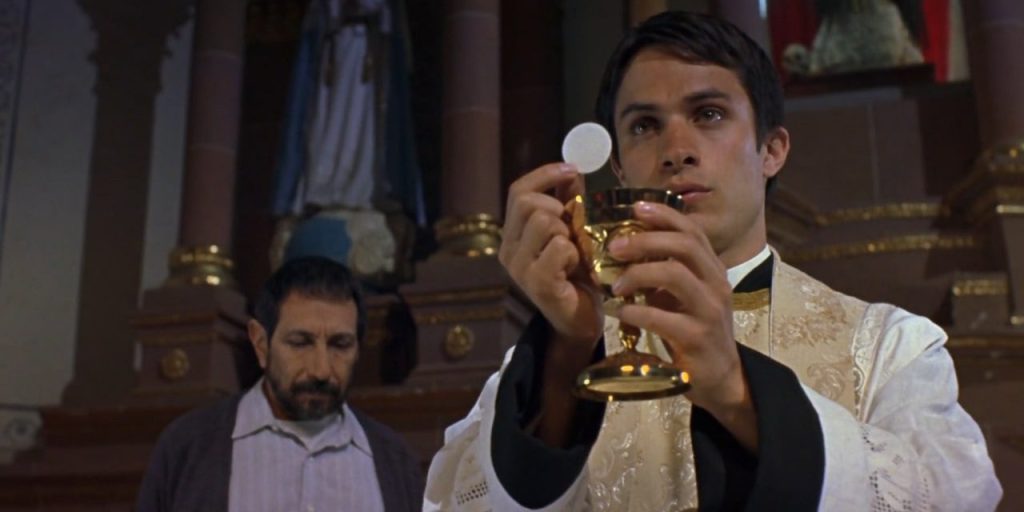
Originally titled ‘El crimen del padre Amaro,’ ‘The Crime of Padre Amaro’ tells the story of Father Amaro, a newly ordained priest whose tenure in a rural parish is challenged by a myriad of corruption scandals within the local Church. Matters get further complicated when the young priest begins developing a forbidden love affair with a young woman, Amelia, which could prove devastating to his reputation and career moving forward. Under the direction of Carlos Carrera, the story contrasts the different points of view while also engaging viewers in an entertaining drama rife with personal stakes.
The 2002 movie is adapted from 19th-century Portuguese writer José Maria de Eça de Queiroz’s novel ‘O Crime do Padre Amaro: cenas da vida devota,’ which caused uproar and controversy upon its publication in 1875. The film follows a largely similar pattern to ‘Conclave,’ depicting a morally compromised landscape where a lone religious figure tries to find his bearing among a host of challenges. Additionally, the titular protagonist finds himself battling serious ethical quandaries like Cardinal Lawrence, balancing his responsibilities as a priest alongside his desires.
9. Novitiate (2017)
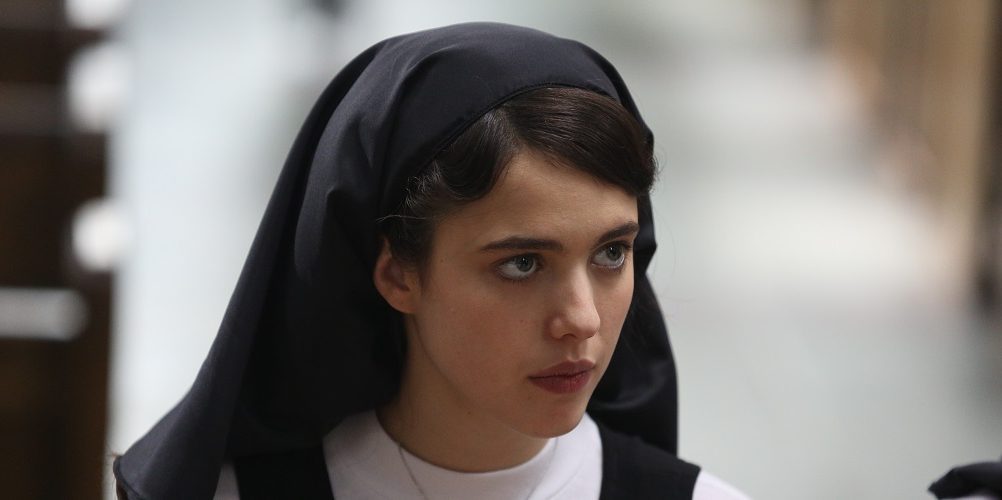
‘Novitiate’ follows a young woman, Cathleen, as she tries to enter a convent to become a nun, subsequently tackling the rigorous regimes of the Church amidst a growing recognition of its fallacies. Set during the 1960s, the Maggie Betts directorial uncovers a difficult period of religious reform within the Catholic Church introduced by Vatican II, which brings a new wave of thinking and understanding within the halls of the ecclesiastical hierarchy, particularly through the eyes of an aspiring nun. Like Cardinal Lawrence, Maggie faces doubts about her faith as the shifting foundations of the Church bring newfound uncertainty to everyone involved. Both films highlight the conflict between the Church’s authority and one’s spiritual needs at a time when traditional values are brought into question.
8. We Have a Pope (2011)
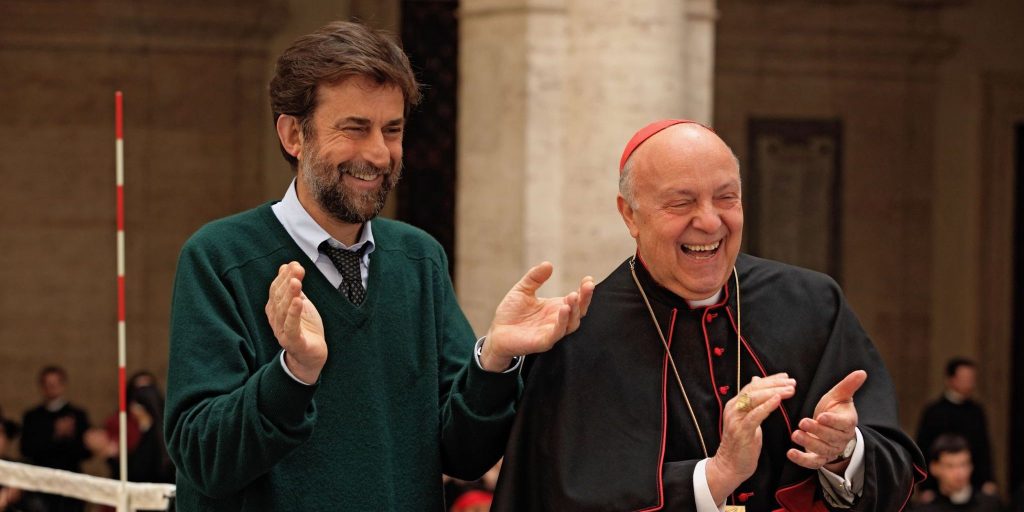
‘Under the direction of Nanni Moretti, who also stars in the film, ‘We Have a Pope’ is an Italian-French comedy-drama centered around the election of a new pope, Cardinal Melville, who refuses to take up his new post citing a severe lack of confidence and faith in his election. Subsequently, a psychiatrist is hired by the Vatican to handle the newly elected pontiff’s issues, beginning a journey of mutual growth and understanding as the two try to help each other in their immensely pressurized jobs.
Originally titled ‘Habemus Papam,’ the movie elegantly rounds off the complexities of the Vatican through a humorous but deeply poignant story. Although more light-hearted than ‘Conclave,’ fans will enjoy the papal dynamics integral to the narrative, particularly showcased through the humanity of individual characters and how important religious figures can seem vulnerable in their moments of doubt. Moreover, the two films revolve around the papal election process, bringing a unique viewpoint on a high-profile event that is pivotal to the progress of the Roman Catholic Church.
7. The Shoes of the Fisherman (1968)
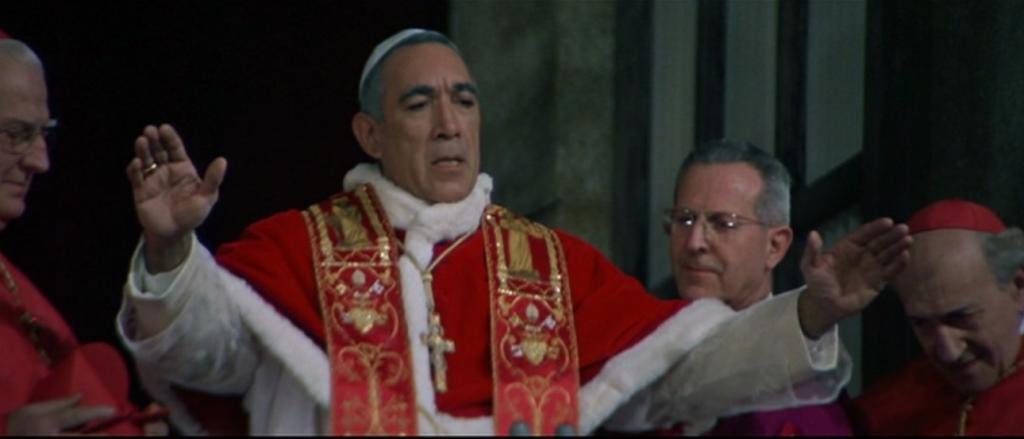
Based on Morris West’s eponymous 1963 novel, ‘The Shoes of the Fisherman’ dives into an epic political drama revolving around religious matters. The movie follows Ukrainian archbishop Kiril Lakota, who ascends to the throne of pope in the middle of rising political tensions between the West and the East at the height of the Cold War. With nuclear conflict threatening to tear the world and its population into pieces, Lakota must showcase his leadership while all of humanity teeters on the brink of devastation. If you enjoyed ‘Conclave’ for its exploration of morality in the Vatican Halls, the Michael Anderson directorial weighs in on those same themes by presenting a compelling drama that emphasizes the need for unity in a time of great division.
6. First Reformed (2017)
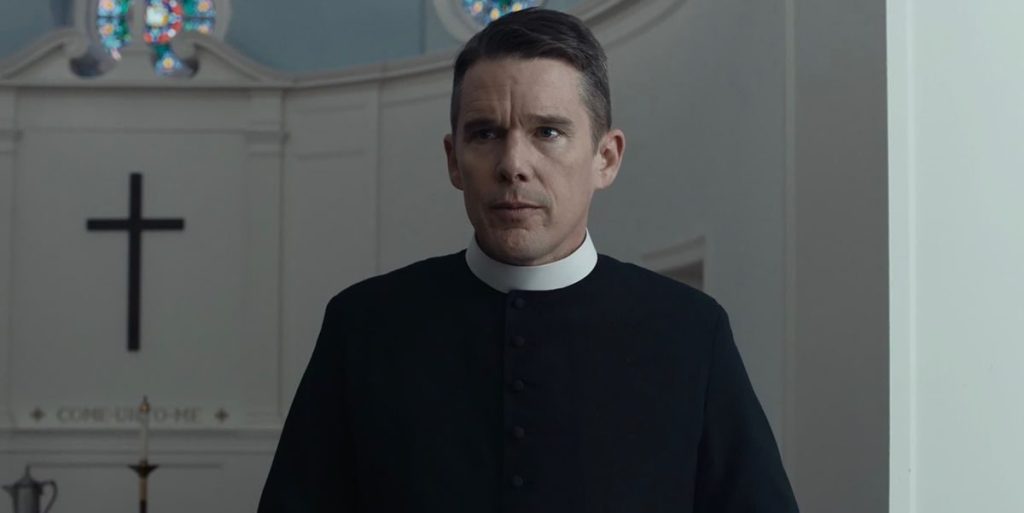
Written and directed by Paul Schrader, ‘First Reformed‘ dives into the exploits of Reverend Ernst Toller, a pastor in upstate New York who grapples with a crisis of faith following the death of his son and his failed marriage. When a pregnant woman named Mary asks Toller to counsel her husband’s growing despair over his environmental activism, the protagonist’s life is upended as he begins questioning the Church’s moral fiber and its role in a contemporary society plagued with modern problems.
In a similar fashion to ‘Conclave,’ the film poses several challenging quandaries that starkly highlight the shortcomings of important institutions like the Church while also paving the way for its importance in an ever-darkening world with no easy salvation. Intriguingly, both Toller and Lawrence go through similar journeys that center on themes of tradition vs. reform and the responsibility of religious leaders to show a way forward for those gripped with crisis.
5. Calvary (2014)
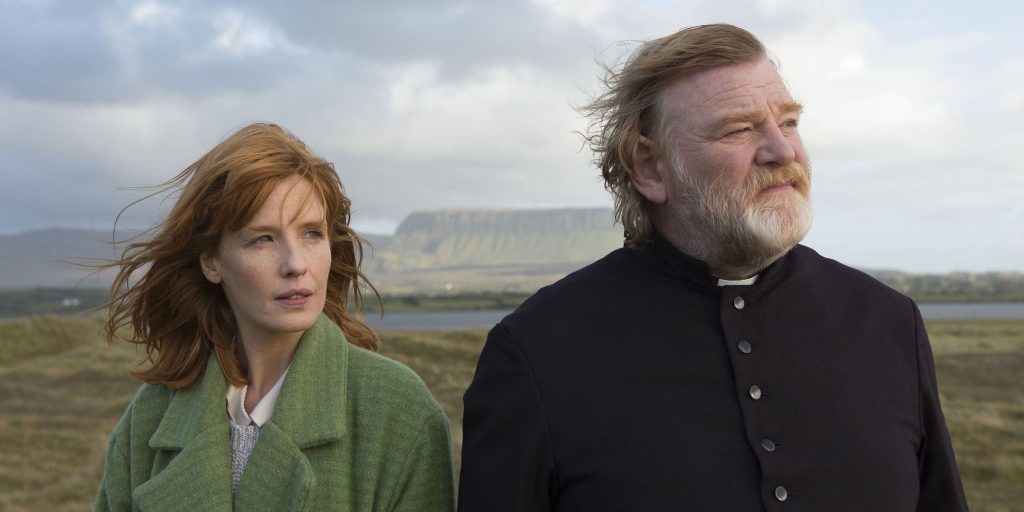
‘Calvary’ is a dark comedy-drama about a Catholic priest, Father James Lavelle, whose duty in a small Irish village is upended following a death threat sent to him via an anonymous confession. Subsequently, Lavelle tries to deal with the secrets of his Church while also grappling with morality, faith, and resignation to his fate. The John Michael McDonagh directorial parallels the themes of ‘Conclave,’ particularly its emphasis on the moral decline within esteemed institutions, its pitfalls, and how they can set greater things into motion despite being swept under the carpet of tradition.
4. Silence (2016)
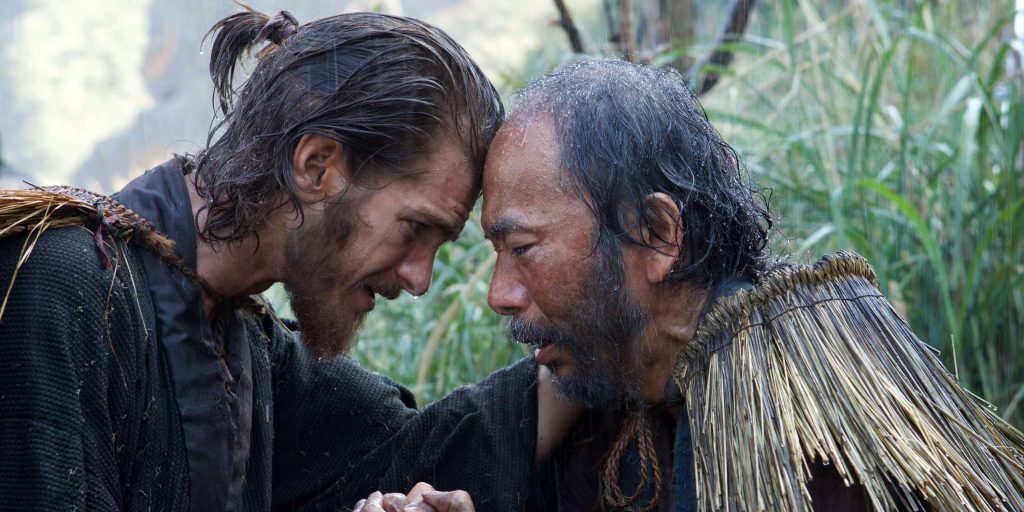
Directed by Martin Scorsese, ‘Silence’ tells the story of two Jesuit priests, Sebastião Rodrigues and Francisco Garupe, who travel to Japan during the 17th century in search of their mentor, Father Ferreira, rumored to have apostatized. Upon arriving, the two priests become witnesses to the suffering of Japanese Christians in the middle of an Inquisition that is weeding out all practitioners of the Jesuit faith. As they try to seek out their teacher, they end up facing monumental hurdles of their own, testing them spiritually, emotionally, and morally.
Adapted from Shūsaku Endō’s eponymous 1966 novel, the religious drama explores heartwrenching themes of torture, betrayal, conflict, politics, and moral dilemmas in a troubled period. It aligns with ‘Conclave’ through its focus on the human spirit in difficult circumstances and religious leadership, especially with regard to the intersection between personal responsibility and loyalty to the Church. Although the stakes may differ dramatically, the two films ultimately highlight the unique bond between suffering and faith.
3. Doubt (2008)
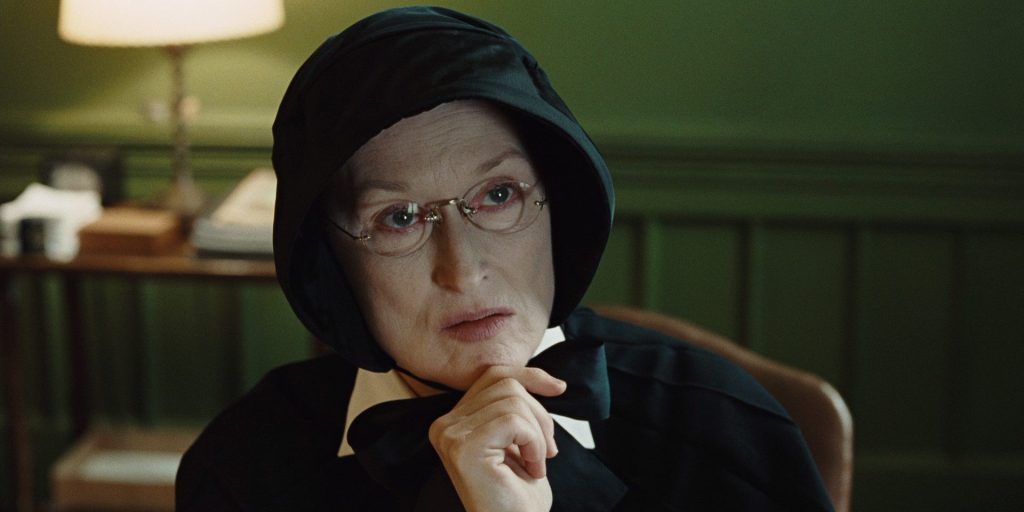
Under the direction of John Patrick Shanley, ‘Doubt’ delves into the inner workings of a Catholic elementary school in the 1960s Bronx. The film centers around the conflict between Sister Aloysius Beauvier, a strict nun, and Father Brendan Flynn, a charming priest. The two start butting heads after Beauvier becomes doubtful of Father Flynn’s bond with the school’s only Black student, Donald Miller. She starts building a case to expose his disingenuous behavior despite lacking evidence to do so.
Viewers of ‘Conclave’ who enjoyed the ambiguous and intelligent drama layered throughout the narrative will enjoy the complex social and political ground covered by ‘Doubt,’ mainly how it leaves the audience questioning the motives and actions of its characters. It is based on Shanley’s 2005 play ‘Doubt: A Parable,’ and elegantly unravels the pressures of traditional institutes and their resistance to reform amidst a cry for justice, which mirrors the challenges faced by Lawrence during the papal elections.
2. The Name of the Rose (1986)
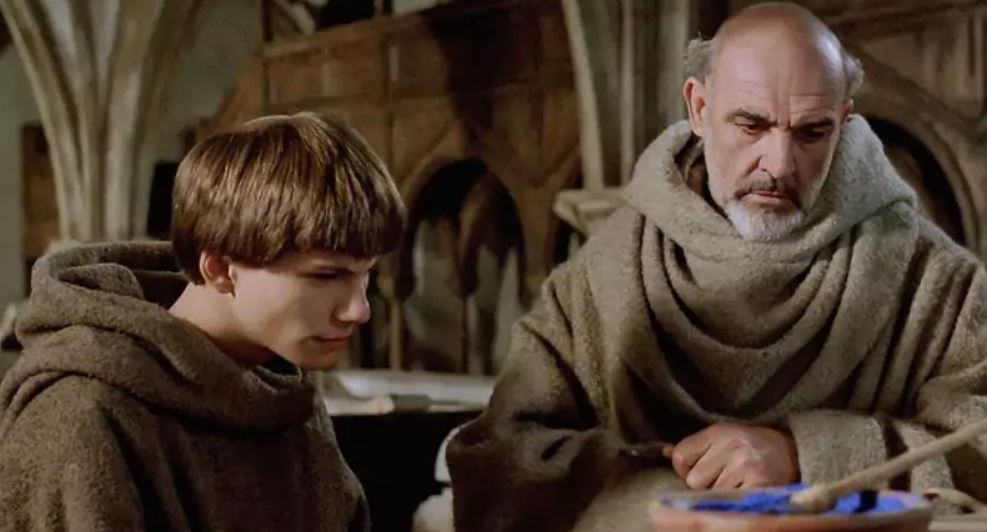
In ‘The Name of the Rose,’ a Franciscan friar named William of Baskerville and his novice, Adso, begin an investigation into a series of mysterious deaths in an Italian monastery during the 14th century. Based on Umberto Eco’s eponymous 1980 novel, the story revolves around a web of secrets, lies, and deception that brings to light a dark conspiracy threatening to upend the monastery’s foundations as corruption spreads among its ranks. Although more historical in its depiction, the Jean-Jacques Annaud directorial aligns with ‘Conclave’ through its devotion to a mystery thriller narration, emphasizing a taut, suspenseful story that is brimming with the same religious undertones and political ambitions, opening the door to dwindling faith and characters with dubious agendas in the house of God.
1. The Two Popes (2019)
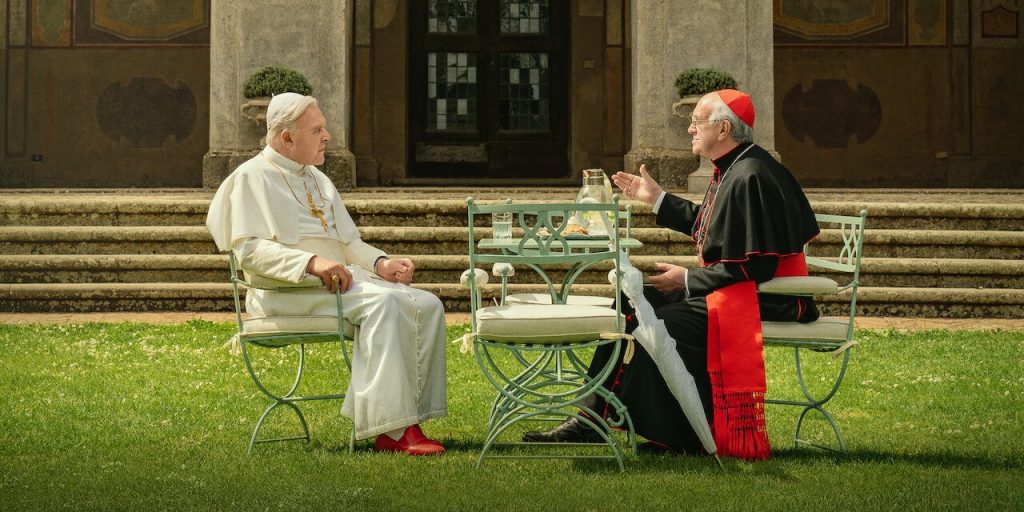
Adapted from Anthony McCarten’s play ‘The Pope,’ ‘The Two Popes‘ is a story about the relationship between Pope Benedict XVI and the future Pope Francis as told through a fictional meeting between the two religious figures in the Halls of the Vatican. Throughout their conversation, the two discuss their views on the Catholic Church, espousing their differing beliefs on how the Roman Catholic Church can evolve moving forward.
Directed by Fernando Meirelles, the comedy-drama explores the two sides of the Church’s traditionalist and reformist divide, with Benedict being a proponent for the former while Francis is a progressive reformer, which alights upon the same discussions held within the Vatican Halls in ‘Conclave.’ Fans of the latter will particularly latch on to ‘The Two Popes’ for its exploration of personal and institutional loyalties, showcasing how power and individual responsibility are critical factors in any environment. The film garnered numerous accolades, including three nominations at the 2020 Academy Awards for Best Actor, Best Supporting Actor, and Best Adapted Screenplay.
Read More: Did Ralph Fiennes Learn Latin and Italian For Conclave?

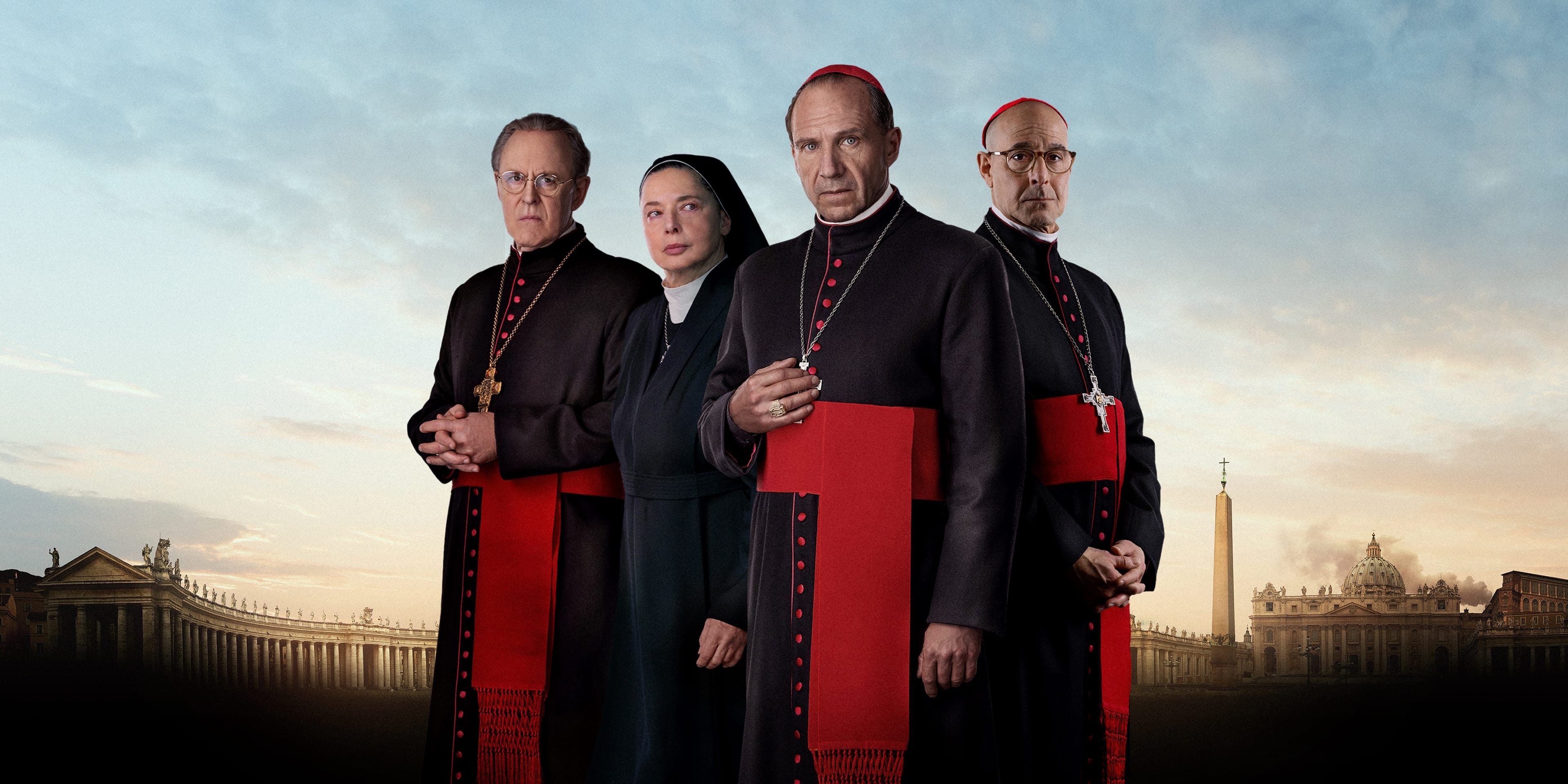
You must be logged in to post a comment.